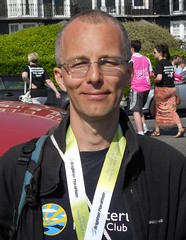 [Another in a series of posts designed to disguise my failure to come up with a daily sea ice bet. But I'll get there.]
[Another in a series of posts designed to disguise my failure to come up with a daily sea ice bet. But I'll get there.]
 The backstory: a while ago, last September, some friends mentioned that they were training for the Brighton Marathon and would I like to run the Grunty Fen half marathon in two weeks time? At that point I'd been running for about half a year (starting from "rowing and running, but I should add that I'd been fairly fit before then) so I said yes. Since then I've pulled my half marathon score down from 1:51 to 1:41, and done some training runs out to 32k, which is 3/4 of the real distance. But now it was time to do the Real Thing.
The backstory: a while ago, last September, some friends mentioned that they were training for the Brighton Marathon and would I like to run the Grunty Fen half marathon in two weeks time? At that point I'd been running for about half a year (starting from "rowing and running, but I should add that I'd been fairly fit before then) so I said yes. Since then I've pulled my half marathon score down from 1:51 to 1:41, and done some training runs out to 32k, which is 3/4 of the real distance. But now it was time to do the Real Thing.
Being a numbers sort of person I constructed a chart to predict my performance.
The pale blue, with the extended dotted line, goes through my existing runs (the 26k and 32k points are real, too, but not as competitive as the 21k-and-below so I felt entitled to neglect them). The dotted line is excel's power-law fit, which I selected because it, err, happened to go smoothly through all the data points. And it extrapolates to 3:37. Ahem. My initial target time was sub-4, but enboldened by this I decided that 3:45 was realistic, and so set that.
However, this careful plan did not survive contact with reality. Because in the end I came in 4:20:.32 :-(. Which is a rather disappointing time. The proximate why is fairly obvious from the GPS track - after about 2h my performance tails off dismally.
Excuses excuses
I feel obliged to offer my excuses, even though you don't care, because they might be instructive to others.
The prickly heat, Carruthers
Well, it was a hot day. That doesn't make for good times. There isn't much I could do about that, though.
Pre-race taper
The normal training plan is to do stuff, then taper off in the 3-ish weeks before the race, ideally doing very little in the last few days, so as to arrive in tip-top condition. Instead, I did the Vets Head last Sunday, far and away the best 30 min erg I've ever done on Wednesday, and too much 10k on Thursday. And then I walked 5 miles to the start on Sunday morning (more on that anon). Next time I'm taking the taper far more seriously.
Race nutrition
For a half marathon, I've got into the habit of an energy gel at 10 k, then another at 15 and 20. For the marathon, I wanted the equivalent of a gel every 5 k. They were offering energy drinks, and some solid-ish gel-blocks, at various points around the course, so I decided I could use those, and only took a few of my own gels. This didn't work at all well, for a couple of reasons. Firstly, the solid-ish blocks were indigestible in the context of a marathon. Second, it wasn't possible to drink enough of the energy drinks. One bottle was supposed to be ~a gel. But I could at most drink half a bottle, and often less than that, since it was hard to interleave drinking water and energy drinks. And I didn't have the brain to run and plan drinks at the same time. So next time I'll forget the official nutrition and rely on my own.
Far from the madding crowd
I failed to get into a start bin that I wanted, and so spent the first bit of the race wanting to run faster than the people around me. This wasn't a great surprise; it often happens. In my experience even being in a good bin doesn't help much as there are always people with totally unrealistic expectations of their time who push themselves up to far (ahem). What was a surprise, this time, was just how far the too-crowded-to-get-past, let alone run-easily, phase lasted. Certainly past 5 k, probably up to 10 k. The exact distance doesn't matter, what did matter was that it was impossible to get a decent start. And worse, I tried to push it too hard, dodging between people and then being forced to brake and generally wasting energy. So my top tip (apart from entering a smaller race) would be to relax off the start line until gaps just naturally appear.
Pix and general ambience
Folks streaming up towards the start in the park.
General view of the finish "line". The finish gate is visible in the distance. After that the finish "production line" kicks in, with the water, bananas, foil space blanket, the pick-up-your-medal, then the goody bag, then the tea shirt. Then the collapse-in-a-heap-on-the-side. And once you're ready, pick up your pre-race-stowed-kit from the baggage lorries, and fight your way through the crowds out in the the real world again. This pic was taken, obviously enough, after I'd fought my way out so gives a very poor impression of how crowded it was earlier.
Geometry
I mentioned above that I'd ended up walking 5 miles to the start, which I distinctly don't recommend (it felt fine at the time, I was bright and fresh in a gorgeous early morning, but I was burning up reserves I should not have). This was because I had, ahem, well ended up not having a hotel room, due to Brighton being unexpectedly full that weekend. Who could have guessed? So I bivvied on the undercliff track, and a very pleasant night I had of it too (it really was pleasant, that isn't our conventional English understatement. I'd do it again, but get a taxi to the start next time).
Here I am, and here it the view east towards the sunrise:
And don't forget the porridge.
Charity
I didn't do it for charity, I did it for me. But if you feel enthused to give, my friend Mike Bullard ran for The Stroke Association and James Edgoose for Water Aid.

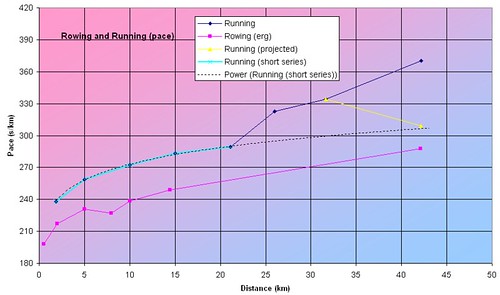

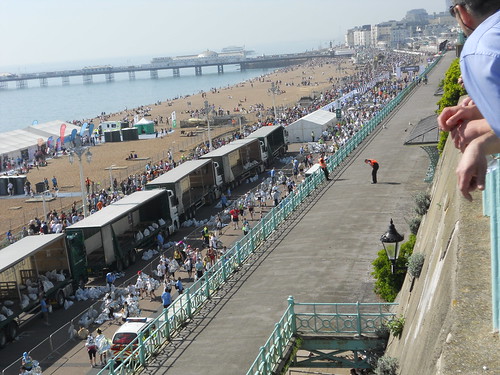
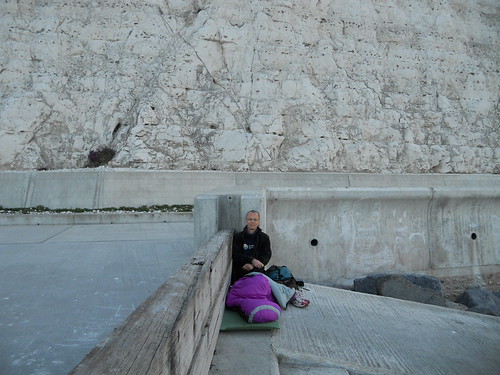
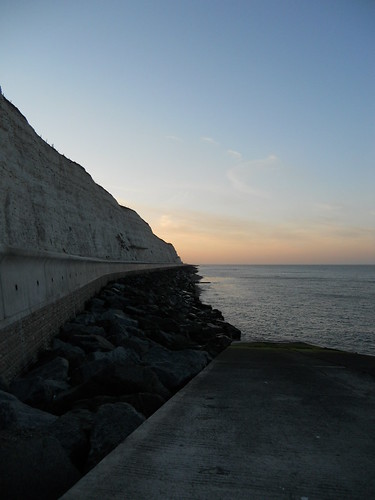
My suspicion is that the food/drink the crowds and the five mile walk are what really caused your difficulty.
Tapering is way overrated. People find tapering important mostly because they are either over-trained or much more likely under rested (they are not the same thing--few people are actually over trained.) Running is so abusive that having time to let your body completely heal does help, but the erg and rowing are not likely to hurt as long as you get enough sleep. I'm not sure if your Thursday 10K was an erg, an OTW row or run.
Getting food right is pretty basic but always tricky when traveling. Even world class athletes have screwed up big races because of something they eat or eat at the wrong time. It is tricky when traveling and the more you can control the better.
It was a big mistake trying to make up time by getting past people at the beginning. It has been shown many times that the best pacing strategy is an even pace from start to finish or a slight increase in pace as the race goes on. IF you have any doubts about this try a 2K on the erg where the first 1000m is at a pace 2 seconds faster then your recent best--you will end up loosing at least 10-12 seconds, in the second half. By going faster you have to carry all the additional waste products from the hard pace all the way to the end. If you start two seconds slower then what you are capable of you will be able to finish stronger and make up most of the lost time.
Same with the run. If you start too slowly you will finish strong and still have a decent time. IF you start too fast you will slow down a lot and loose much more time.
Finally the first time you do anything you haven't done before, do it conservatively.
[Thanks. I think that last piece of advice is good (as well as quite general), and this may have finally rubbed it in :-). The bit about carrying the waste products is also a good way of thinking about the pacing -W]
I'll disagree with Nosmo and say your problem wasn't fuelling or pacing - my bet would be lack of endurance - i.e insufficient training for the distance. I think this is far more often a problem than fuelling - not that fuelling, hydration, electrolytes etc can't be problems and warm conditions (the UK has warm weather?) would make them more likely to be problems, as would walking 8k to the start but still I'd bet lack of endurance training.
Endurance training seems to have a long half-life - so even you do the same long runs as an experienced runner in the months leading up to a marathon, the experienced runner also has benefits from endurance training before that maybe stretching back years.
[That could be good news, for the future. I will admit to having slightly skimped the long distance stuff, as I only did a few (maybe 4 in total over 21 k) -W]
Ha, Ha...my first thought on starting to read this was something along the lines of "How does he expect to get a good time given that it was a hot day and he's got sooo much hair on his bonce?"
Of course, I now realise that I've really not been keeping up in terms of the current state of the Bellette coiffure...in which case, I think it was probably a mix of lack of endurance training, poor pacing and inadequate refuelling
[Hasis gets splinter lodged in his ar*e whilst maneuvering on the top of the fence]
[Ha, I've added the post-race photo of me to confute your so-called hairy theory. Behold the man! -W]
I've had trouble maintaining my pace over the years whenever I've run over ~2 hours (I've run 4 marathons and a 20 mile race at these longer distances). Whilst I'm no world-beater, my times over the shorter distances would indicate that I could do a better marathon time. I reached half-marathon distance in the 20-miler in 1h31 but then nose-dived (no gels or energy drinks) and finished in about 2h40. MY marathon PB was ~3h56 at a very steady 9 mins/mile pace (lesson learnt from the 20 miler!). Since then I've tried upping my marathon pace slightly, but ended up running the second half slower and having a slower overall time.
My inference to date is that I have poor aerobic / 'fat-burning' fitness; I assume that I'm burning too much glycogen early in the race. So refueling, and refueling early, would help with this, but its a struggle. Assuming that this is the case, the problem I've found is in improving my 'lower gear' fitness. I seem to pop up into a 'higher gear' very easily. On a long slow run, if I increase the pace gradually it doesn't take me long to reach a difficult, breathless state. However, if I make a concious effort to accelerate I can run fine at a faster pace (but obviously not for that long).
Sounds like I'm not alone. Any tips out there for improving that endurance fitness?
I'd agree that you lack endurance training and likely would have done much better with more. However you still could have had a better run if you paced yourself correctly. You did OK in your 50K row and what did you do before that, one half marathon on the erg? In any case I think I remember that it was not nearly enough.
I have coached and ridden with people on 100 mile bike rides who have never gone over 60 miles in their life. They did OK and while they slowed towards the end it was well within reason. They took it very easy in the beginning and resisted all temptation to go hard on the hills or when people passed them and they did just fine.
So yes, more endurance would have helped a lot, but you could have done much better then you did with under the circumstances.
Endurance is difficult to get running because long distances can be so hard on one's body. I stopped doing marathons after my second one because it took me a month to really recover from each. My second marathon was a bad race because of digestive problems--attempting to carbo load I ended up with bad gas and stomach cramps. It was a lesson that I viewed at the time as costing me four months of training.
If you do longs runs for endurance take them very slowly. Stop and walk, eat and drink. Except for the really fast runners who are close to the front, most ultra marathoners walk up hills and they all manage food and fluid along the way. You need not to overdo it or you won't recover fast enough and loose too much training time.
Another way is to do most of your endurance cross training. As Andrew said endurance does have a long half life. It is the hardest component of fitness to get but also the easiest to keep. So you don't need to do as much in the few months before the marathon if you have already built up a good base. For example you can build up to doing long bike rides a twice a week (say one 50-60 and one 70-100 mile ride per week). Do that for several months, but in the 2 to 4 months before the marathon, drop down to one long ride every two weeks. You could do something similar rowing but there it would be something like one full marathon and one 20-30K per week. You will have trouble finding anyone crazy enough to do it with you (RowPro, on-line training with others will help) so you would probably have to row a single or do it on the erg (if you could stand it--but at least your 5K erg pieces would seem really short). Again in the few months before the marathon just do a long row once every two weeks. I keep the strokes per minute relatively high and the pace slow which will avoid building up rowing muscles.
At the risk of coming off as a jerk (too late I know)... you should ask yourself why are doing these things that you are not really prepared for? What are you trying to prove? Are you afraid of dying? Afraid of getting old? Trying to prove you are still young? Bragging rights?
Seriously, people who make goals their highest priority (whether it is finishing a marathon or even just working out five times a week) and stick to them no matter what often end up injured, or quitting after a few years. If the focus of your training is not enjoyment and long term health and fitness then you should re-evaluate what you are doing. Don't risk injury or sacrifice your health just for some silly goal. You should be in this for the long term and improving your health should be primary not secondary. Don't risk it by running too much when you are hurting (in different shoes)or doing things you are not really ready for (50K rows, marathon runs). I speak from experience here, it is not worth it.
[What-is-it-all-for is a good question, and the answer is that I don't really know. At the moment I'm not too troubled by not knowing. Everything is coming together quite well, the marathon result was a setback not a disaster, I'll do some more training and try again in 6 months or a year. I have the summer bumps to concentrate on now, so I can't take the running too seriously at the moment. Injury: yes, that is a worry, as for all runners. I've had a couple of spells of months off running while recovering from various things in the past year-or-so, and don't want any more -W]
Do your knees hurt?
[Not especially. Certainly no more than before I ran -W]
This "disappointing time" effect is really quite common amongst first time marathon runners. I wouldn't over think it, as the cause is most likely a lack of endurance training and an inability to deal with the dreaded "wall" (the walk in the morning probably didn't help).
No doubt you've heard (and experienced) that at the 30-35km mark, things become dramatically more difficult, even with gu? Hardcore runners can get through this due to lots and lots of endurance training, that equips your body to use available glycogen much more efficiently. You can simulate this effect for training purposes (a little) by running first thing in the morning, before breakfast, when you've got an empty stomach. I've been doing this myself, and noticed a distinct difference in the way my body can handle 25km+ type distances.
But look on the bright side. You've finished a full marathon, which is no mean feat. If you keep the longer runs going (and stay injury free!), your times will improve. With your good half-marathon times, is fairly clear that the second half of the race is where you've got to focus now.
I'd agree with so much already commented. Nutrition really isn't the problem unless you haven't been refuelling properly after training sessions or have poor diet generally. I don't bother with gels or similar for the marathons I've done and avoid the energy drinks now because my body seems to not like them (someone else said something similar).
That said my best performances have been when I've timed breakfast right and topped up with a banana a little while before the start.
I love camping out before my races, done that for all of them even when late October in Wales:-)
Key to you getting toward that 3:45 I think from my experience is endurance training and pacing, a slower/steady start and more even pace throughout.